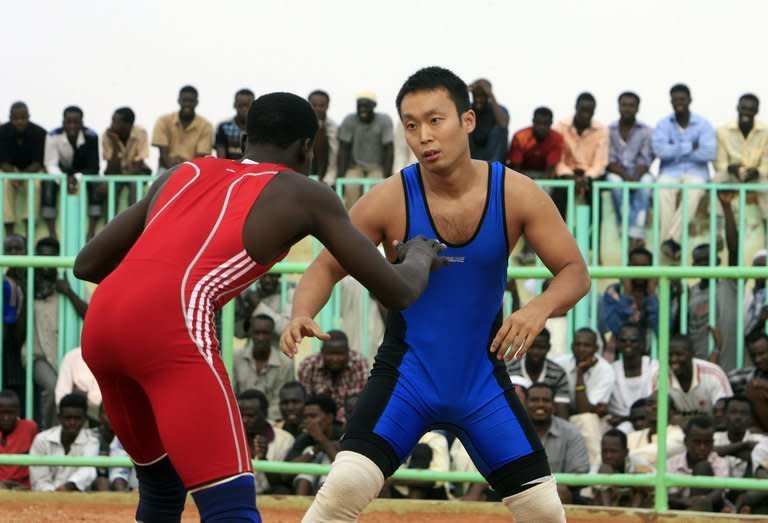Barefoot Japanese diplomat wrestles for peace in Sudan
In the thousands of years of Sudanese Nuba wrestling history, there had never been anything like it: A barefoot Japanese diplomat in a tight-fitting blue singlet stepping onto the sandy pitch to take on Sudan's toughest. Four times this year, Yasuhiro Murotatsu has challenged the Sudanese. Four times he has lost. But "Muro" is not giving up. He says his wrestling diplomacy highlights this "precious culture" and can help unite a divided country. The Nuba Mountains of South Kordofan state are home to a linguistically and religiously diverse group of people collectively known as "Nuba". Wrestling is central to their farm-based society, but for more than two years a more modern form of combat has devastated the region. Non-Arab rebels from South Kordofan have joined with other insurgents from Darfur, in Sudan's west, in rising against the Arab-dominated regime which they complain has marginalised the regions. "Sudanese wrestling can be a symbol of a united Sudan," says Murotatsu, 33, a Japanese embassy political officer who tries to spend one hour a day training for his bouts. "That's why I am fighting. This is very important. I will be very happy if all tribes... come to Haj Yousef to support Sudanese wrestling. This is my intention," he said before his latest match at the stadium in the Khartoum district. More than one million people in South Kordofan and Blue Nile states have been displaced or severely affected by fighting in the area, the UN says. At the same time in Darfur, tribal violence has worsened this year, leaving hundreds dead and uprooting hundreds of thousands more. Murotatsu has competed since February in special "friendship" matches during the regular Friday evening card in Haj Yousef, a poor neighbourhood of mud-brick houses. He says the Sudanese sport is similar to the more widely-known freestyle wrestling, in which he finished among the top eight when he was in junior high school. "I read about wrestling in Nuba Mountains before I came to Sudan... I became quite interested" and wanted to challenge them. "I thought that I could win," says Murotatsu, a former oil industry administrator who is fluent in Arabic. "I think I'm good," he proclaimed in an interview with AFP before his latest match. Murotatsu's opponent is a thin, muscular high school student, Saleh Omar Bol Tia Kafi, who says he has been wrestling since the age of 12. "I would come to the ring, watch the matches, and after that I wrestled with other young boys," says Kafi, 18. He competes under the nickname "Al-Mudiriya", the same moniker used by his father, a wrestler who is "one of the heroes of the Nuba Mountains" -- and Kafi's inspiration. Nuba men would hold impromptu matches while in the fields caring for their cows, Kafi says, wearing a tracksuit in the colours of the Sudanese flag. Kafi came to Khartoum from the Nuba region at the age of eight. He lives with his family but some relatives who remained in South Kordofan have fled to the mountains because of the fighting, he says. The war has hit the sport hard in its Nuba homeland but wrestling still takes place, officials say. It is now formally known as "Sudanese" wrestling because it has grown beyond the Nuba community, says Hassan Abu Ras Saliem, deputy chief of the local wrestling federation. "We are fully convinced that this wrestling can unite Sudan," says Al-Tayeb Ahmed Ajoan, the federation's secretary general. And that is Muro's wish, as he sits on the edge of the circular red-earth pitch, stretching before his latest match. Fans have taken up every inch of the stadium, which was built by the Khartoum state government a year ago. They even perch atop the concrete wall, moving to the rhythmic music played between bouts. Small boys lugging plastic containers of drinking water and silver cups squeeze through the crowd, while women sell trays of snacks. Far away, people are fighting and dying in Sudan's wars but here in the stadium, fans from different parts of the country have come together in joy. "I think this wrestling can have a role in ending racism in Sudan," said Mutasim Ahmed, who is from North Kordofan and is a regular spectator. A Darfur native, Abdurrahman Tajideen, said he supported local boy Mudiriya because "he is representing Sudan." The widening appeal of the sport to people like Tajideen from other ethnic groups means it could help bring peace to the country, and the Nuba region in particular, said wrestling fan Hafiz Sulaiman, a Nuba. Sulaiman was hoping for a Muro victory "because he lost three matches and still came back. This means he has good will". Hands raised, concentrating in a half-crouch, the two wrestlers move cautiously, pawing each other like cats as the match begins. The pace picks up. Mudiriya holds Muro around the waist and pulls him into the dirt before the Japanese twists around. Mudiriya is on his back. Muro raises his arms, as if in victory. No, not yet. They play on, Mudiriya's left shoulder dusted with dirt. After about three minutes he puts Muro on the ground again. Game over. Mudiriya wins. "A lion! He's a lion!" a female fan calls in his honour as the two athletes are hoisted up by others. "Muro's tactics were completely different from last time and his skill has improved," a sweating Mudiriya tells AFP. "He's a very good wrestler," the Japanese diplomat says, vowing a return to the ring. "I cannot withdraw until I get at least one victory." A win in Khartoum would, he hopes, pave the way for a bout in the wrestling heartland of Nuba itself. "It will be a very good message for peace," Murotatsu says.



